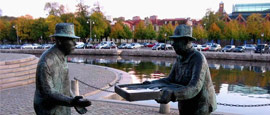Gothenburg History
Despite its ancient-looking centre, Gothenburg was actually founded in 1603 by King Charles IX. His purpose was to create a jumping off point for wars with Denmark and Poland, with the city taking shape from the ruins of three failed mediaeval settlements and dominated by fortifications from the start.
Eight years after the city was christened Göteborg, it was ravaged by invading Danish forces during the Kalmar War. It wouldn’t be resurrected again until 1619, when King Gustav II Adolf gave the city its own charter and allowed it to govern itself.
Gothenburg steamed ahead, with the Swedish East India Company helping to turn the city into a thriving port fuelled by trade with China and the Far East. Its position was strengthened further when it refused to take part in Napoleon’s Continental Blockade, thus strengthening trade with the UK.
The city used the completion of the Göta Canal in 1832 to build on its reputation for shipping – something it still has today. It remains the busiest port in the Scandinavian region with over 10,000 vessels docking annually. More economic success came courtesy of Volvo, which set up factories in the city in 1927.
In the 1900s, it became the main point of departure for Scandinavian immigrants heading to the US, hence why a Gothenburg in Nebraska exists.
For all the industry, the city’s cultural life also flourished with Gothenburg becoming an important centre for the arts. This continued during WWII, helped along by an influx of refugees - among them the Jews of occupied Denmark, many of whom disembarked in Gothenburg.
Today, despite recessions, the Cold War and international turmoil, the city remains an important trading hub with the centre appearing little changed from its earliest days.
The biggest change recently has been to its name. City councillors opted to officially change the name of the city from Göteborg to the anglicised Gothenburg in 2009.
Did you know?
• The 17th century, Älvsborg Fortress protected Gothenburg against the Danes. It still stands today.
• Although generally thought to be British, locals argue that the legendary Beowulf was in fact from Gothenburg.
• Gothenburg will celebrate its 400th anniversary in 2021.
Do you have any Feedback about this page?
© 2026 Columbus Travel Media Ltd. All rights reserved. No part of this site may be reproduced without our written permission, click here for information on Columbus Content Solutions.




 You know where
You know where